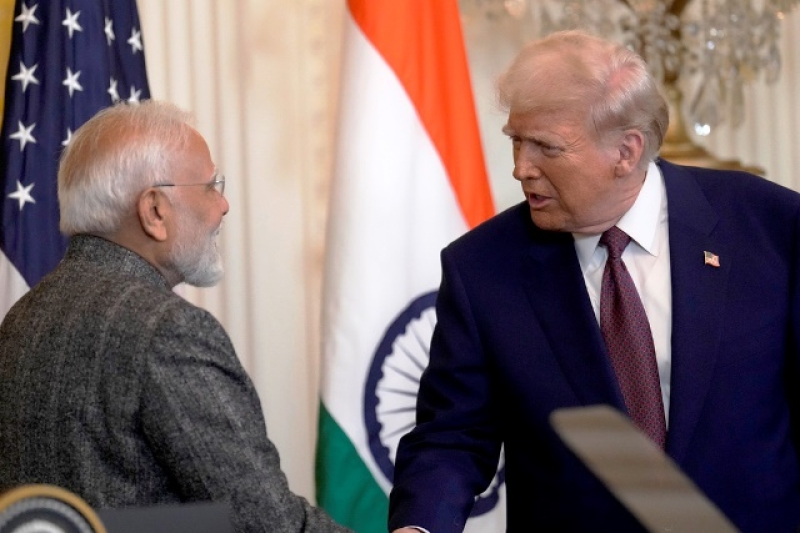- US Supreme Court Voids Donald Trump Global Tariffs |
- India looks forward to engaging with new govt in Bangladesh |
- No more running after doctors, services to reach doorsteps |
- ‘Revolutionary’ shift in economy, stock market soon: Amir Khashru |
- Stocks end week sharply lower as DSE, CSE indices tumble |
Trump Denies US Role in BD Crisis, Leaves Resolution to Modi

President Donald Trump, right, shakes the hand of Indian Prime Minister Narendra Modi at the conclusion of a news conference in the East Room of the White House, Thursday, Feb. 13, 2025, in Washington. (AP Photo-Ben Curtis)
In a press briefing today (14 February) following a meeting with Indian Prime Minister Narendra Modi at the White House, newly elected US President Donald Trump firmly rejected claims of any US deep state involvement in the ongoing crisis in Bangladesh.
Trump stated, "The United States has not played any role in the Bangladesh situation. I am leaving it to Prime Minister Modi to handle the issue."
This declaration came as Modi became one of the first world leaders to visit the US following Trump's second term inauguration. The two leaders met in Washington on 13 February to discuss a wide array of topics, from weapons sales to trade, but sidestepped sensitive discussions on human rights and minority issues, a subject that has recently taken a backseat in US-India relations, experts note. With India emerging as a key partner in countering China and expanding trade with the US, concerns over its human rights record have been largely overlooked in Washington.
In a broader context, Trump also announced a major new trade agreement with India aimed at reducing the trade deficit. Under this deal, India will increase its imports of oil and gas from the US. President Trump emphasized that this agreement will strengthen bilateral ties and provide new economic opportunities for both nations.
During the meeting, Modi outlined his vision to double India’s trade with the US by 2030, calling the White House meeting “excellent” and a pivotal step in enhancing US-India relations. On social media, Modi lauded the talks as a significant boost to their strategic partnership.
Further solidifying the growing defense cooperation between the two countries, President Trump confirmed that the US would move forward with supplying India advanced F-35 stealth fighter jets. This follows extensive discussions between the two leaders, where they agreed to deepen collaboration in sectors such as energy, critical technologies, and global connectivity. Trump's administration is set to increase military sales to India by billions of dollars starting this year.
Trump also addressed the issue of India's tariffs on American goods, which can exceed 70% on items like cars. He described this as a "major issue" but pointed to the increased export of US oil and gas to India as a potential solution to help balance the trade deficit between the two nations.

